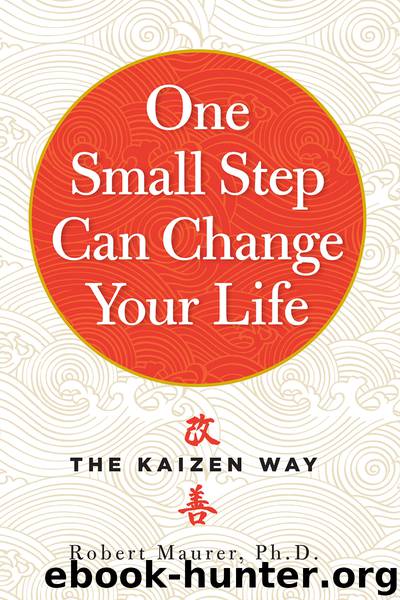One Small Step Can Change Your Life by Robert Maurer

Author:Robert Maurer [Maurer, Robert]
Language: eng
Format: epub
Publisher: Workman Publishing Company
Published: 2014-10-15T04:00:00+00:00
Chapter Four
Take Small Actions
Small actions are at the heart of kaizen. By taking steps so tiny that they seem trivial or even laughable, you’ll sail calmly past obstacles that have defeated you before. Slowly—but painlessly!—you’ll cultivate an appetite for continued success and lay down a permanent new route to change.
Small actions form the basis of most kaizen programs for change, for an obvious reason: No matter how much you prepare or practice small questions and small thoughts, eventually you must enter the arena of action. This is true whether you plan to hang out a shingle for your new business or confront a difficult family member. But since this is kaizen, your first actions will be very small ones—so small that you might find them odd or even silly. That’s okay. It’s helpful to have a sense of humor when you’re trying to change your life. Some wonderful examples of kaizen actions are included in the chart that follows.
Goal Kaizen Action
Stop overspending Remove one object from the shopping cart before heading to the cash register.
Begin an exercise program Stand—yes, just stand!—on the treadmill for a few minutes every morning.
Manage stress Once a day, note where your body is holding tension (your neck? lower back? shoulders?). Then take one deep breath.
Keep the house clean Pick an area of the house, set a timer for five minutes, and tidy up. Stop when the timer goes off.
Learn a foreign language Commit one new word to memory every day. If that’s too hard, practice repeating the same new word once or twice a day for a week, adding a new word each week.
Get more sleep Go to bed one minute earlier at night, or stay in bed one minute later in the morning.
These little actions usually sound bizarre to the uninitiated. But if you have struggled to make a big change—to drop twenty pounds, to change careers, or to steady a sinking romance—and failed, then you might appreciate how small changes can help. Remember, big, bold efforts to make a change can be counterproductive. Many of these efforts don’t take into account the weighty obstacles that may lie in the path: a lack of time, tight budgets, or a deeply ingrained resistance to change. As we’ve learned, radical programs for change can arouse your hidden and not-so-hidden doubts and fears (What if I fail? What if I achieve my goal—and I’m still unhappy?), setting off the amygdala’s alarms. Your brain responds to this fear with skyrocketing levels of stress hormones and lower levels of creativity instead of the positive, consistent energy you need to reach your long-term goals.
Small actions take very little time or money, and they are agreeable even to those of us who haven’t laid up bulk supplies of willpower. Small actions trick the brain into thinking: Hey, this change is so tiny that it’s no big deal. No need to get worked up.
Download
This site does not store any files on its server. We only index and link to content provided by other sites. Please contact the content providers to delete copyright contents if any and email us, we'll remove relevant links or contents immediately.
Hit Refresh by Satya Nadella(9140)
The Compound Effect by Darren Hardy(8975)
Change Your Questions, Change Your Life by Marilee Adams(7786)
Nudge - Improving Decisions about Health, Wealth, and Happiness by Thaler Sunstein(7711)
The Black Swan by Nassim Nicholas Taleb(7136)
Deep Work by Cal Newport(7089)
Rich Dad Poor Dad by Robert T. Kiyosaki(6642)
Daring Greatly by Brene Brown(6518)
Principles: Life and Work by Ray Dalio(6459)
Playing to Win_ How Strategy Really Works by A.G. Lafley & Roger L. Martin(6316)
Man-made Catastrophes and Risk Information Concealment by Dmitry Chernov & Didier Sornette(6022)
Big Magic: Creative Living Beyond Fear by Elizabeth Gilbert(5778)
Digital Minimalism by Cal Newport;(5767)
The Myth of the Strong Leader by Archie Brown(5511)
The Slight Edge by Jeff Olson(5420)
Discipline Equals Freedom by Jocko Willink(5391)
The Motivation Myth by Jeff Haden(5214)
The Laws of Human Nature by Robert Greene(5213)
Stone's Rules by Roger Stone(5089)
